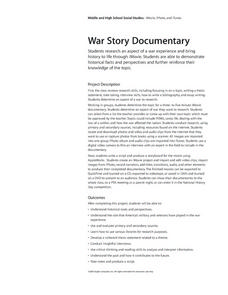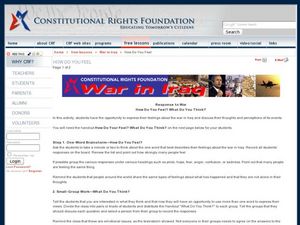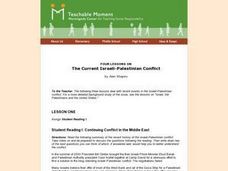Smithsonian Institution
Two Perspectives on the Battle of Little Bighorn/Greasy Grass
Learners understand why historians conduct research and the importance of perception when it comes to studying history. The resource covers The Wars of Expansion and the Battle of Little Bighorn/Greasy Grass through group work, debate,...
Curated OER
Marching Towards War
The first Great War began on July 28, 1914 after the assassination of Archduke Franz Ferdinand. But were there other causes? Yes, and your class will find out all about nationalism, imperialism, the Triple Alliance, and other key players...
Curated OER
Create a Public Opinion Survey: The Middle East in the News
Though the discrete content here is a pair of New York Times articles about a 1998 military strike on Iraq and the coincident impeachment by the House of Representatives of then-President Clinton, this detailed plan for creating,...
Curated OER
Mapping Your State's Role in the Vietnam War
Students recognize reasons to celebrate Memorial Day. Students create a map of victims of the VIetnam War. Using the internet, students research information about soldiers from their state who were killd in action in Vietnam. Students...
Curated OER
Comparing Visual Interpretations and Actual Events: War & Battle
A Venn Diagram is used to compare artistic and historical representations of a single event. Young analysts view the provided images, read textbook descriptions, and discuss the validity of each representation in terms of bias and...
Curated OER
Cartoons in the Classroom: Doves, Flags, and Bombs
A political cartoon is timely and thought-provoking. Learners analyze the symbolism found in the cartoon as it relates to current tensions between North and South Korea. Three in-depth analysis questions guide and stimulate class...
Curated OER
Perceptions of War
Tenth graders share perspectives on war with Iraq with students from various countries, and write position papers expressing specific stance on issues.
Curated OER
Why do wars occur?
Understanding the causes of war is one way (possibly) to prevent it. World War II is used as a case study to facilitate an understanding of reasons why wars start. Topics covered included Totalitarianism, scarcity of resources, need for...
Curated OER
"Truth, War and Consequences"
View a film called "Truth, War and Consequences," available for purchase on PBS, with your class. They answer comprehension questions and practice their critical thinking skills as well.
Curated OER
War Story Documentary
Middle schoolers review research skills and determine an aspect of war to research. They research an aspect of a war experience and bring history to life through iMovie.
Curated OER
Photojournalism: A Record of War
Students explore who has photographed war and why. They examine Mathew Brady's process for photgraphing the Civil War. Students investigate how photographic equipment has changed and improved through time. They analyze primary source war...
Curated OER
Response to War: How Do You Feel? What Do You Think?
The class discusses how they feel about war. They brainstorm emotions that teens have toward the war in Iraq, and then discuss their opinions of the war in small groups. The discussion is then opened up to the entire class. What do you...
Curated OER
The Current Israeli-Palestinian Conflict
Examine recent events in the Israeli-Palestinian conflict. Three lessons, multiple excerpts, evaluation questions, and activities are all included to make your class globally aware.
Curated OER
Student Travel in the Shadow of War
Learners research and discuss pros and cons of study abroad during times of war, and document decisions and positions of local school administrators on topic. Students then write editorials voicing their opinions.
Curated OER
War Story Documentary
Students research and create an aspect of a war. They practice on writing a bibliography and essays.
Curated OER
What Is War?
What kinds of human activity do we define as "warlike"? Middle and high schoolers examine various definitions of war and types of warfare, especially as these descriptions relate to the kinds of war we are witnessing at the beginning of...
Curated OER
Civil Liberties and War Powers: Korematsu v. United States
Eleventh graders compare and contrast Supreme Court decisions dealing with the application of civil rights during times of war, with emphasis on discrimination and detention. Working in groups, 11th graders review cases and analyze how...
Curated OER
Debate Topics and Ideas
Students examine both sides of arguments surrounding given debates. They use the internet and other research to collect information to support their stand on the controversial issue. Students debate their chosen topic. This lesson plans...
Curated OER
Introductory Lesson Plan
Students explore the reasons for the Vietnam War. In this World History lesson plan, students complete three activities that expand and reinforce their knowledge on why the Vietnam war was fought.
Curated OER
The Home Front: Convincing Americans to Help America Prepare
Sixth graders examine the actions of the U.S. Government after the attack on Pearl Harbor. In this preparation for war lesson, 6th graders analyze WWII posters and view a clip on the American Home Front. Students discuss and list the...
Curated OER
Linear Equations
Seventh graders explore battle plans using grids. In this linear equation lesson, 7th graders see how math is used in battle. Students create a grid on the floor using tape and plastic army men to serve as the points. Students discuss...
Curated OER
Who Started World War I?
Students debate which power was responsible for the outbreak of World War I. In this cause and effects lesson, students research the causes of the outbreak of World War I on ProQuest in preparation for a (limited) reenactment of the...
Curated OER
Make War, Not Love?
In this war worksheet, students complete 4 activities that address war terminology and opinions.
Curated OER
Questions of War and Peace: Using Case Studies to Teach the History of American Foreign Policy
Students read three case studies to focus on how the United States dealt with foreign policy issues. In groups, they read about the decision to drop the atomic bomb, the commitment of troops to Vietnam and wwhether to send troops to...

























